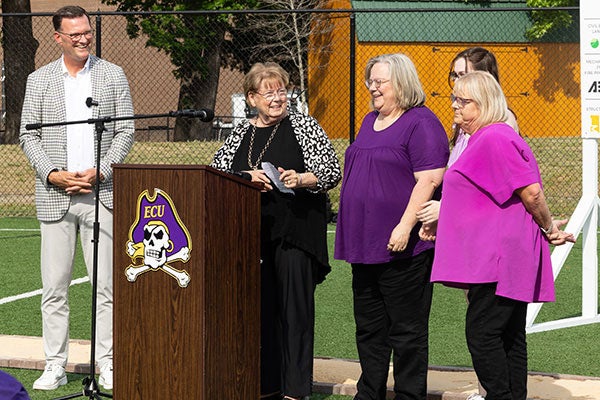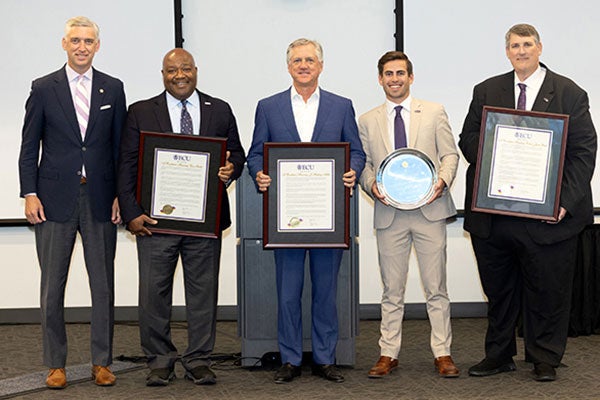ECU trustees celebrate a year of accomplishments
By the Numbers
The Isley Indoor Performance Center and Wornom Family Field will include:
- 85,000 square feet of space
- 120-yard synthetic turf field
- 580 tons of structural steel
- 2,000 truckloads of dirt to build site
- 320,000-gallon stormwater holding system
- 36-foot by 20-foot videoboard
- Six 20-foot by 10-foot garage doors
- 8,000 square feet of padding
- 68 feet of ceiling clearance at highest point
Amid the evolving world of college athletics, the East Carolina University Board of Trustees celebrated a change coming to the campus landscape.
ECU broke ground Thursday on the new Isley Indoor Performance Center and Wornom Family Field, an 85,000-square-foot facility that marks another milestone in the history of Pirate Nation.
“It really is going to redefine the footprint of our athletics department,” said Jon Gilbert, director of athletics.
The full board met for its final regular meeting of the academic year, approving conferral of degrees for about 4,660 spring and summer graduates for commencement on May 9 as well as the 2025-26 budget. Trustees and Chancellor Philip Rogers thanked outgoing board members and celebrated an academic year full of accomplishments.
One of those accomplishments included Thursday’s groundbreaking ceremony. In addressing the large crowd, Gilbert thanked the roughly 2,500 donors who fully funded the $24.5 million facility, including Jennifer and Van Isley, Sandra Wornom and her late husband Sam, and Lance and Heath Clark and Bill Clark Homes.
Gilbert also thanked trustees for “continued support of our athletic department. The leadership and guidance that you provide is second to none and we just are very appreciative of you approving this project and helping us forge the direction in which we’re going.”
The building, expected to be completed in October 2026, will be located on the Grady-White Boats Athletic Campus near the football practice field. Pirate football players who had just completed spring practice and many other student-athletes who will benefit from the practice and training facility attended the ceremony on the multipurpose turf field.
“This project is more than construction,” said Gilbert. “It’s a symbol of what’s possible when people come together for a shared purpose and vision.”
Gilbert addressed anticipated changes in college athletics earlier in the day in front of the Athletics and Advancement Committee. He discussed an expected NCAA lawsuit settlement that would affect the number of scholarships for student-athletes, anticipating an increase in baseball and women’s Olympic sports scholarships. Student-athletes in football, men’s and women’s basketball, and baseball would also receive a share of revenue from ticket sales, game guarantees, media rights and other athletic categories.
The committee, followed by the full board, approved a $10.3 million expansion of Clark-LeClair Stadium. The 11,000-square-foot addition was fully funded through cash and gift-in-kind donations. It includes an expansion of the players’ locker room, video room and coaches’ room. A new club deck with loge seating and patio will be built down the left-field line. As an associated entity, the capital project requires UNC System Board of Governors (BOG) approval. Groundbreaking is set for August with anticipated completion by the end of 2026.
Celebrating Good Times

Jon Gilbert, left, director of athletics, listens as Sandra Wornom speaks on behalf of her family during a groundbreaking ceremony for the Isley Indoor Performance Center and Wornom Family Field.
In his remarks to trustees, Rogers individually thanked outgoing board members Fielding Miller, Jason Poole and Vince Smith, presenting each with framed resolutions of appreciation approved by the full board. He also thanked outgoing Student Government Association president Anderson Ward, who received a commemorative, engraved silver salver.
“We’re fortunate to have board members who are passionate about this university,” Rogers said.
Rogers also reflected on an academic year of success, noting implementation of Chancellor’s Scholars student scholarships, the university’s R1 research designation and the groundbreaking of the Center for Medical Education Building.
He also noted that ECU is the only 2025 R1 institution in the nation to also be awarded the Carnegie Leadership for Public Purpose designation, the Elective Community Engagement classification (2024), the C. Peter Magrath Community Engagement Scholarship Award, and the Association of Public and Land-grant Universities Innovation and Economic Prosperity designation.
“Our history, spanning from our founding until this very moment, is a testament to our commitment to adapting and innovating to serve our students and our region, regardless of the challenges and complexities that arise,” Rogers said. “This academic year stands as another remarkable chapter in our legacy, as we continue to uphold our future-focused and mission-driven university identity.”
Reports from the Staff Senate, Faculty Senate, SGA and Board of Visitors also noted accomplishments for the year, including the Faculty Senate’s 60th anniversary.
Budget Approval
Approved on the consent agenda after unanimous approval Thursday in the Budget, Facilities and Infrastructure Committee, the all funds budget includes an estimated $1.18 billion in operating revenues and $1.17 billion in expenses.
Stephanie Coleman, vice chancellor for administration and finance, told committee members that the budget anticipates impacts from external influences including uncertainty around federal research caps and limited recurring state funds due to personal and corporate tax revenue projections.
Trustee Carl Rogers asked what impact a state budget shortfall would have on ECU. Coleman said a 1.5% reduction in state funding would result in about a $5 million cut for ECU. Her team has been working with departments and divisions campuswide to prepare for possible cuts. ECU’s budget will be presented to the UNC System BOG in May.
Facilities and Policies

From left, ECU Chancellor Philip Rogers stands with outgoing Board of Trustees members Vince Smith, Fielding Miller, Anderson Ward and Jason Poole.
Bill Bagnell, associate vice chancellor of operations, presented pre-selection committee recommendations for TA Loving and Blum Construction – A Joint Venture as construction manager at risk (CMR) for the regional outpatient behavioral health facility to be constructed on MacGregor Downs Road. Blum Construction was approved as CMR for the Howell Science Building North comprehensive renovation project.
Funding was approved for advance planning for the following: Mendenhall Phase 3 & 4 renovation design; Todd Dining Hall crawl space reconditioning; Blount Fields improvements; and Fletcher Residence Hall water intrusion repairs. In addition, the committee approved capital authorization for Scott and Jarvis residence halls HVAC controls totaling $630,000.
Trustees authorized ECU staff to explore the feasibility of building a chancellor’s residence on university-owned property adjacent to the Dail House using non-state funds. The board is expected to receive an update at its next regularly scheduled meeting.
Leases were approved for the following: the current location of the registrar’s office at 207 E. Fifth Street, with a term for three years with two, one-year renewal options. The registrar’s office is scheduled to move to Mendenhall once Phase 3 renovations are complete; and the Department of Surgery clinical and office space at 503 Bowman Gray Drive, for five years with two, five-year renewal options. The space will house outpatient clinics for general surgery, bariatric surgery, trauma surgery and pediatric surgery that are currently at 517 Moye Blvd.
Six approved ECU policy updates — needed because of updates to UNC System personnel policies — included: EHRA leave programs; faculty serious illness and parental leave; leave policy for 12-month faculty; notice of nondiscrimination; parking and traffic ordinance; and university motor vehicle policy.
Dr. Chris Buddo, interim provost and vice chancellor for academic affairs, gave trustees in the University Affairs Committee a report about student-athlete admissions, academic performance and progress toward a degree as required. No significant findings or irregularities were reported.
Buddo reported on waivers for undergraduate degrees that are needed for programs that require more than 120 semester credit hours as mandated by the BOG. ECU has two programs, nursing and engineering, that exceed the limit.
Student Recruitment, Retention
Trustees heard a third installment in a series of reports on recruitment and retention tactics in the joint meeting of the Strategy and Innovation, and University Affairs committees.
Vice Chancellor for Advancement Christopher Dyba told the committee that talent retention efforts have resulted in retaining 77 commitments to Chancellor’s Scholars offers so far for fall 2025.
“We know it’s working,” Dyba said. “The advancement team will continue to promote Chancellor’s Scholars and get these scholarships funded. It’s the right thing to do and it’s the strategic thing to do to attract students here with financial offers because they’re going to go somewhere else [if we don’t].”
ECU staff also reported potential students are opening recruiting emails and clicking video links at a higher rate than at other UNC System schools, a positive sign for enrollment growth.
Audit, Risk Management
Becky Welch, assistant vice chancellor for research administration and compliance, talked to the Audit, Risk Management, Compliance and Ethics Committee about changes at the federal level that may affect audits of research grants. She said the uncertainty that is present on the federal level won’t affect how her team approaches that work on a university level.
“Our group continues to do what we need to do,” she said, noting that some federal grant reviews expected this spring did not occur on time.
The committee also heard an update on a process to streamline and develop consistency in student advising regardless of degree major. Dr. Allen Guidry, associate provost for learner operations, reported that advisors in different colleges often worked with different systems and different timelines.
Among the solutions is the fall implementation of an “advising syllabus” that details both advisor and student commitments and expectations. He also displayed a portal that allows advisors and students to view information all in one location, information that can help identify at-risk students. “It allows us to be proactive,” Guidry said.
